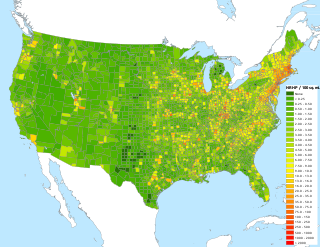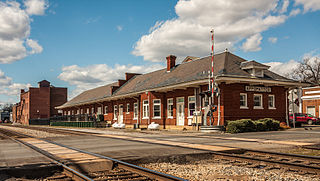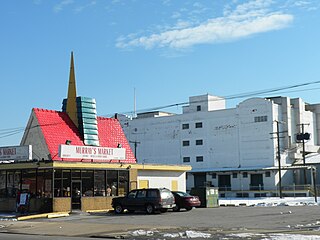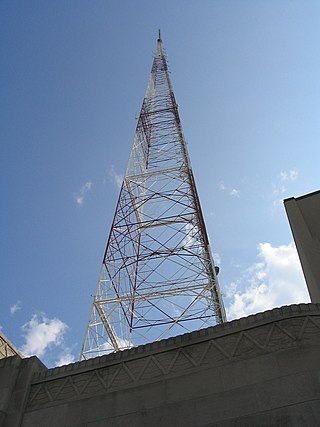
The National Register of Historic Places in the United States is a register including buildings, sites, structures, districts, and objects. The Register automatically includes all National Historic Landmarks as well as all historic areas administered by the U.S. National Park Service. Since its introduction in 1966, more than 97,000 separate listings have been added to the register.

The Southern Terminal is a former railway complex located at 306 West Depot Avenue in Knoxville, Tennessee, USA. The complex, which includes a passenger terminal and express depot adjacent to a large railyard, was built in 1903 by the Southern Railway. Both the terminal and depot were designed by noted train station architect Frank Pierce Milburn (1868–1926). In 1985, the terminal complex, along with several dozen warehouses and storefronts in the adjacent Old City and vicinity, were listed on the National Register of Historic Places as the Southern Terminal and Warehouse Historic District.

The Appomattox Historic District national historic district located at Appomattox, Appomattox County, Virginia. It contains 297 contributing buildings, 6 contributing structures, and 3 contributing objects in Appomattox. It includes Courthouse Square, the commercial district surrounding the railroad tracks, the Appomattox depot (1923), and surrounding residential areas dating back to the 19th century. Notable buildings include the Appomattox Courthouse (1892), Appomattox County Jail (1895-1897), County Office Building (1940), Knickerbocker Hotel (1892), Bank of Appomattox (1906), Appomattox Middle School (1908), Appomattox Pentecostal Holiness Church, and "The Nebraska House".

Farmville Historic District is a national historic district located at Farmville, Prince Edward County, Virginia. It encompasses 246 contributing buildings and 1 contributing object in the central business district and surrounding residential areas of Farmville. It includes a variety of commercial, residential, institutional, and industrial buildings dating from the mid-19th to early-20th centuries. Notable buildings include the Paulett-Gill house, Farmville Presbyterian Church, Johns Memorial Episcopal Church (1881), Farmville Methodist Church (1907), Hotel Weyanoke (1925), the warehouses of the Dunnington Tobacco Company and Central Virginia Processing, Inc., the former Craddock-Terry Shoe Company, the former Cunningham and Company tobacco prizery, Norfolk and Western Railroad passenger station, Doyne Building, the Watkins M. Abbitt Federal Building (1917), Prince Edward County Courthouse, and the former Farmville High School (1913). Located in the district is the separately listed First Baptist Church.

Railroad Terminal Historic District is a national historic district in Binghamton in Broome County, New York. The district includes 19 contributing buildings. Four of the buildings were directly related to Binghamton's rail passenger and freight operations, including the passenger station. Five buildings were built as warehouses, and ten were built to house retail activities with residential or office uses on the upper floors. The buildings were built between 1876 and 1910, with a major addition to one of them completed in 1932. This Delaware, Lackawanna and Western Railroad passenger station, with its Italian Renaissance campanile, was built in 1901. For most years of passenger service to Binghamton, Delaware and Hudson Railway and Erie Railroad trains used a different station 150 yards away.

The Crescent Warehouse Historic District is a 10.5-acre (4.2 ha) historic district in Downtown Davenport, Iowa, United States. The district is a collection of multi-story brick structures that formerly housed warehouses and factories. Most of the buildings have been converted into loft apartments. The district was listed on the National Register of Historic Places in 2003.

The Bristol Commercial Historic District is a national historic district in Bristol, Tennessee and Bristol, Virginia.

Wheeling Warehouse Historic District is a national historic district located at Wheeling, Ohio County, West Virginia. The district includes 20 contributing buildings and 11 contributing structures. They are warehouses and commercial style buildings and structures between Main Street and the Ohio River. All of the buildings date to the late-19th and early-20th century. The warehouses are mostly two- and three-story masonry buildings. The two-story commercial buildings have storefronts on the first floor and residential units above. Notable buildings and structures include the Pump Store (1933), Wheeling Stamping Plant (1932), Allied Plate Glass, Warwick China, Boury Warehouse, Ott-Heiskell Company, Edward Wagner Wholesale Grocers building (1915), the Moderne style former Greyhound Bus Station, and Main Street Bridge (1891).

Berryville Historic District is a national historic district located at Berryville, Clarke County, Virginia. It encompasses 313 contributing buildings and 1 contributing object in the town of Berryville. They include a variety of residential, commercial, and industrial buildings dating from the late 18th century to the 1930s. Notable buildings include the Treadwell Smith House, Sarah Stribling House, Crow's Nest (1830s), Berryville Presbyterian Church, Grace Episcopal Church (1857), Coiner's Department Store, Clarke Milling Company, H. W. Baker Grain Warehouse, H. B. Whiting Brothers Warehouse, Berryville railroad depot (1910), the First National Bank, the Farmers and Merchants National Bank, and the U.S. Post Office (1938). The contributing object is the Clarke County Confederate Memorial on the grounds of the courthouse. Located in the district and separately listed is the Old Clarke County Courthouse.

Delaplane Historic District is a national historic district located at Delaplane, Fauquier County, Virginia.

South Boston Historic District is a national historic district located at South Boston, Halifax County, Virginia. The district includes 594 contributing buildings and 7 contributing structures in the Village of South Boston. It consists of industrial, commercial, and residential building types dating from the mid-19th century to the present. Notable buildings include the C.H. Friend School, New Brick Warehouse, Planters and Merchants Bank, Halifax Cotton Mill, R.J. Reynolds Tobacco Company tobacco prizery, former Liggett-Meyer Tobacco Company tobacco prizery, the Parkinson Block (1899), First Presbyterian Church (1887), First Baptist Church, and Mt. Olive Baptist Church.

Northampton Lumber Company Historic District is a historic saw mill and building supply store complex and national historic district located at Nassawadox, Northampton County, Virginia. The district encompasses seven contributing buildings and three contributing structures. They are the retail store, water tower, saw mill, potato shed, barn, 1940s shed, two lumber sheds, and two sets of New York, Pennsylvania, & Norfolk Railroad tracks. The Northampton Lumber Company has been an integral part of the history and livelihood of Nassawadox for over a century.

Foster Falls Historic District is a national historic district located near Max Meadows, Wythe County, Virginia. The district encompasses 12 contributing buildings, 2 contributing sites, and 3 contributing structures in the village of Foster Falls. They are primarily industrial and commercial buildings and structures built in the late-19th century. They include the iron furnace stack, the rail bed and frame railroad passenger station, a general store building, and a combination gristmill/sawmill. The district includes the Foster Falls Hotel, a late-Victorian style brick building. The hotel property includes two brick dependencies associated with an orphanage that occupied the hotel building beginning in 1938. It now serves as the headquarters of the New River Trail State Park.

The Danville Tobacco Warehouse and Residential District is a national historic district located at Danville, Virginia. The district includes 532 contributing buildings, 3 contributing sites, and 2 contributing structures in the city of Danville. The district reflects the late-19th century and early-20th development of Danville as a tobacco processing center and includes residential, commercial, and industrial buildings reflecting that growth. It also includes archaeological sites related to early Native American settlements in the area. Notable buildings include the American Tobacco's Harris Building, the Imperial Tobacco Company Building, Cabell Warehouse, Patton Storage Units, Crowell Motor Company, Municipal Power Station (1912), Riverside Cotton Mill #1 (1886), and a variety of "shotgun" houses and bungalow workers housing. Located in the district are the separately listed Danville Municipal Building and Danville Southern Railway Passenger Depot.

Belfield–Emporia Historic District, also known as North Emporia, is a national historic district located at Emporia, Virginia. The district includes 41 contributing buildings in the Belfield section of Emporia. In 1887, the neighboring towns of Hicksford and Belfield merged to form the town of Emporia. The district generally consists of late-19th- to early-20th-century brick buildings laid out in a "T"-shape at the intersection of Halifax and Baker Streets. Notable buildings include the Hotel Virginia, the Bethlehem Building or former First National Bank of Emporia (1907), Petersburg and Danville Railroad passenger station, and Pair's Furniture. Located in the district is the separately listed H. T. Klugel Architectural Sheet Metal Work Building.

Atlantic Coast Line Railroad Commercial and Industrial Historic District is a national historic district located at Petersburg, Virginia. The district includes 15 contributing buildings, 1 contributing structure, and 1 contributing object located in a predominantly industrial and commercial section of Petersburg. The section housed some of Petersburg's important industries – tobacco and wholesale grocery and confectioner. Notable buildings include the Cameron Building, Export Leaf Tobacco Company (1913), H.P. Harrison Company (1912), Brown & Williamson complex, and Gibson Drive-in.

The Carver Industrial Historic District is a national historic district located at Carver, Richmond, Virginia. The district encompasses 13 contributing buildings located west of downtown Richmond. The industrial area developed between 1890 and 1930, along the tracks of the Richmond, Fredericksburg and Potomac Railroad. The buildings are in a variety of popular 19th-century and early 20th century architectural styles including Queen Anne and Romanesque.

The Scott's Addition Historic District is a national historic district located in Richmond, Virginia.

Wharf Area Historic District is a national historic district located at Staunton, Virginia. The district encompasses 22 contributing buildings and 4 contributing structures. It is a warehouse and commercial district characterized by rows of late-19th century and early-20th century storefronts and an elongated plaza framed by small warehouses. The buildings are characteristically two- and three-story, brick structures in a variety of popular architectural styles including Greek Revival, Federal, and Queen Anne. Notable buildings and structures include the Railroad Water Tower, American Hotel, John Burns Building (1874), Erskine Building (1904), and Chesapeake and Ohio Railroad Station (1902).

The Waverly Downtown Historic District is a national historic district located at Waverly, Sussex County, Virginia. The district encompasses 48 contributing buildings, 1 contributing site, and 2 contributing structures in the central business district of Waverly. The buildings represent a variety of popular architectural styles including Folk Victorian and Italianate. They include residential, commercial, governmental, and institutional buildings dating from the mid-19th to mid-20th centuries. Notable buildings include the Waverly Municipal Hall, Atlantic and Danville Railroad Station, Masonic Lodge/Town Hall, Boarding House, Moss Hardware Building, Fleetwood Building (1904), Warner Grammer Store, Wilcox Building, former Waverly Post Office/ Palace Cigar and Pool Room (1961), and Waverly Town Shops and Water Tower (1932).
























